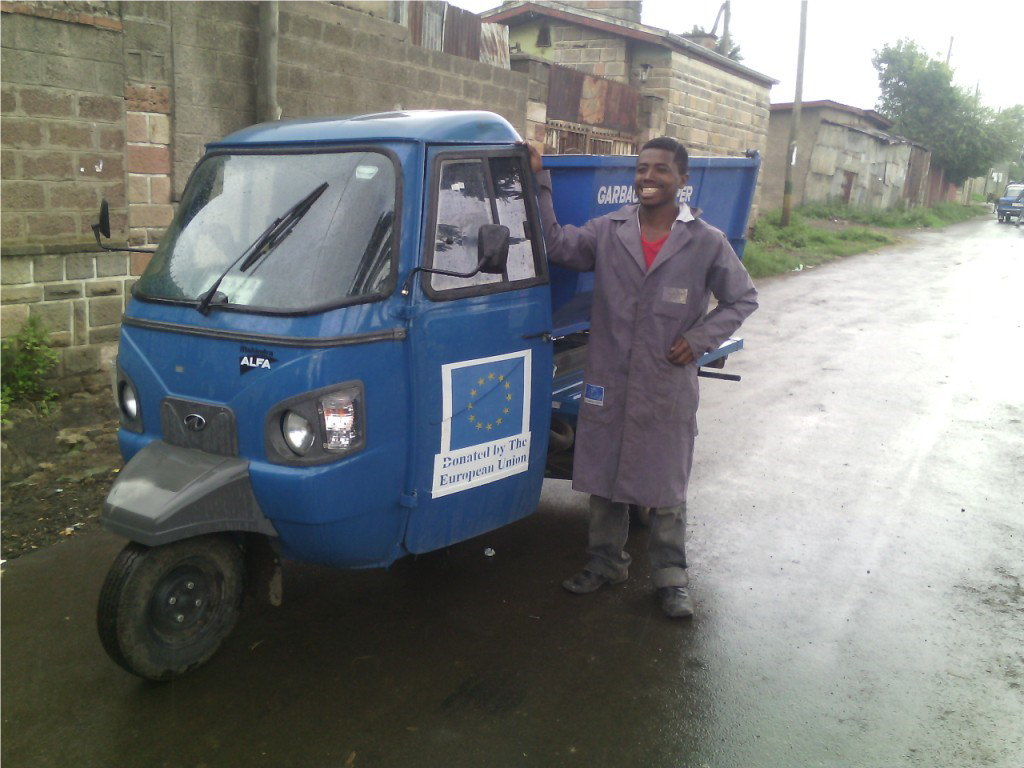Mohammedsani Mustefa, 25, lives in a rented room with his mother in Addis Ketema Sub-City of Addis Ababa. Two years ago, he quitted working as a daily laborer at construction sites due to the back breaking nature of the job, heavy work load, and long working hours with minimal wage. Stayed unemployed for some time, he, together with nine of his female friends, established a solid waste collection small scale enterprise association called ‘SET’ (ሴት – Amharic term for ‘Female’) in 2013, with support obtained from woreda Small Scale Enterprise Development office.
According to Mohammed, at the beginning they were collecting the solid waste door-to-door mainly by carrying on their shoulder and sometimes using hand pushed carts. “The job involved hard work and was very time consuming. Especially, given that the majority of the members are women, one can imagine how difficult it would be for them to carry the waste around house to house and bring all to the pickup site. This way, we used to collect more than 10m3 of solid waste daily,” he recalls, “Risking to our health, we did the collection without using any protective equipment; as a result we suffered a number of respiratory tract infections caused by the odor and leachate of the waste.”
Amref Health Africa’s, Sanitation Daily Project, provided trainings on proper waste management, and protective equipment to 175 waste collectors; and two three-Wheeler solid waste collecting motorbikes for two small scale enterprises at Addis Ketema Sub-City. The ‘SET’ was one of the beneficiaries.
“Thanks to Amref Health Africa, which gave us a motor-bike. We now collect the solid waste and use the bike to transport it to the pickup site. We do this within an hour and half, a work which used to take more than four hours to finish,” Mohammedsani said.
“Inspired by the results of the efficient and effective collection of waste using the motorbikes, many other solid waste collecting associations, including our association, are planning to purchase these motor-bikes to modernize the solid waste collection system and improve our income and the health of members of the association and the community. We are beyond grateful to Amref Health Africa for taking this initiative and support us,” he added.
The team is now having time to sort and arrange recyclable disposed materials such as plastic bottles, metals and chinaware, which they can sell in the local market and make more money.
“Not only have we benefited from increased income, the training Amref provided has also enabled us to properly collect the waste, handle and manage it well, including effective use of personal protective equipment (leather-glove, face mask, eye google, gown…) We are now safe from any health risk and no one misses any working day due to any illnesses that might be resulting from the work,” said Mohammed Sani.
These problems coupled with major factors including low socio-economic status of the community, poor knowledge and awareness of the community about the benefits of sanitation and hygiene practice, and the haphazard settlement pattern and unavailability of land for layout of water supply infrastructure, construction of latrines and proper waste management often challenge the effective implementation of urban WASH projects/ programs in the slum areas. WASH programs that are designed based on detailed assessment and implemented in an integrated manner not only improve the WASH status of the community but also address the basic root causes of the problem that hamper effective implementation of urban WASH interventions.
Amref Health Africa teams up with African communities to create lasting health change.

